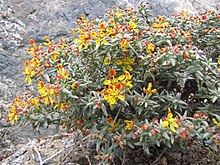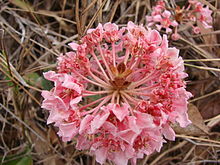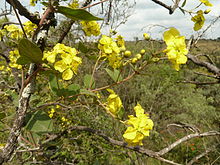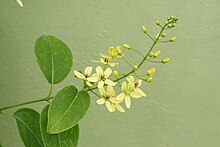Malpighia family
| Malpighia family | ||||||||||||
|---|---|---|---|---|---|---|---|---|---|---|---|---|

|
||||||||||||
| Systematics | ||||||||||||
|
||||||||||||
| Scientific name | ||||||||||||
| Malpighiaceae | ||||||||||||
| Yuss. |
The Malpighiaceae are a family in the order of the Malpighiales (Malpighiales) of the flowering plants (Magnoliopsida). The approximately 1300 species are mainly native to the tropics of South America. The Malpighiaceae family probably originated in the Upper Cretaceous about 68 million years ago in South America.
description
They are mostly woody plants: shrubs , trees and lianas , but also perennial herbaceous plants . The simple leaves are mostly opposite. There are stipules present.
It forms racemose or panicle inflorescences. The often hermaphrodite flowers are usually five-fold with a double flower envelope and are mostly stalked and in many genera the flower stalk sits on a "joint" on the short side axes (Peduncle, Floriferis). There are mostly supporting and pre- leaves. There are four or five sepals, most of which have oil glands. There are usually five petals , which are stalked, the technical term is nailed . The flowers contain two to 15, usually five or ten stamens . Two to five, usually three carpels are a top permanent ovary grown. The sepals and stamens are often still preserved on the fruit.
Stone fruits or berries are often formed.
ingredients
- The appearance of oil glands shows the strong specialization. This oil is mainly collected by female oil bees who use it mixed with pollen as brood food.
- The plants accumulate poisons that were used for fishing.
Systematics and distribution
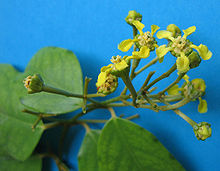
The Malpighiaceae family was established in 1789 by Antoine Laurent de Jussieu in Genera Plantarum , p. 252 under the name "Malpighiae". The type genus is Malpighia L.
The systematics of the Malpighiaceae family is controversial and is divided into subfamilies and tribe differently by the authors. The Malpighiaceae family has been divided into two subfamilies since 2010 and contains 64 to 68 genera with 1250 to 1300 species:
- Subfamily Malpighioideae Burnett : It is part of the Tricomarieae Nied. , Hiraeeae Griseb. , Rhynchophoreae Arènes , Banisterieae DC. , Gaudichaudieae Horan. structured.
- Subfamily Byrsonimoideae WRAnderson : It contains the tribe Byrsonimeae WRAnderson with the three genera Blepharandra Griseb. , Byrsonima Rich. ex Kunth , Diacidia Griseb.
The Malpighiaceae family includes the following genera:
- Acmanthera (A.Juss.) Griseb. : About seven species in South America.
- Acridocarpus Guill. & Perr. (Syn .: Anomalopterys (DC.) G.Don , Anomalopteris (DC.) G.Don orth. Var., Rhinopterys Nied. ): With about 29 species in tropical Africa, Madagascar, Arabia, India and New Caledonia.
- Adelphia W.R. Anderson
- Aenigmatanthera W.R. Anderson
- Alicia W.R. Anderson
- Amorimia W.R.Anderson
- Aspicarpa Rich. (Syn .: Acosmus Desv. ): With about 12 species in America.
- Aspidopterys A. Juss. ex Endl. : With 15–20 species in Indomelesia.
-
Banisteriopsis C.B. Rob. (Syn .: Jubistylis Rusby ): It contains about 90 species, for example
- Banisteriopsis caapi (Spr. Ex Griseb.) Morton
- Barnebya W.R. Anderson & B.Gates : With 2 species in Brazil.
- Blepharandra Griseb. : With about six species in tropical America.
- Brachylophone olive. : With about three species in the tropics of the Old World.
- Bronwenia W.R. Anderson & C.Davis (sometimes in Banisteriopsis C.B.Rob. )
-
Bunchosia Rich. ex Kunth (Syn .: Malacmaea Griseb. ): It contains about 55 species.
- Bunchosia glandulifera (Jacq.) Kunth : From northwestern and northern South America
- Burdachia Mart. ex Endl. (Syn .: Tetrapodenia Gleason ): With about four species in tropical South America.
-
Byrsonima Rich. ex Kunth (Syn .: Alcoceratothrix Nied. , Callyntranthele Nied. ): It contains about 150 species.
- Byrsonima crassifolia (L.) Kunth : Central America, Caribbean, northern South America
- Calcicola W.R. Anderson & C.Davis
- Callaeum Small (Syn .: Cabi Ducke ): With about 10 species in tropical America.
- Calyptostylis Arènes
- Camarea A.St.-Hil. : With about seven species in eastern South America.
- Carolus W.R. Anderson
- Caucanthus Forssk. (Syn .: Diaspis Nied. , Eriocaucanthus Chiov. ): With about three species from eastern and northeastern Africa to Arabia.
- Christianella W.R. Anderson
- Coleostachys A. Juss. : With only one species in tropical South America.
- Cordobia Nied. : With about two species in South America.
- Cottsia Dubard & Dop : It is common in North America.
- Diacidia Griseb. (Syn .: Sipapoa Maguire ): With about 12 species in tropical America.
- Dicella Griseb. : The six or so species are common in South America.
-
Digoniopterys Arènes . With only one type:
- Digoniopterys microphylla Arènes : It occurs in Madagascar.
-
Dinemagonum A. Juss. . With only one type:
- Dinemagonum gayanum A. Juss. : It occurs in Chile.
-
Dinemandra A. Juss. ex Endl. With only one type:
- Dinemandra ericoides A.Juss. : It occurs in Chile and Peru.
- Diplopterys A. Juss. : With about four species in tropical America.
- Echinopterys A. Juss. (Syn .: Coelostylis (Juss.) Kuntze ): With about three kinds in Mexico.
-
Ectopopterys W.R.Anderson : You only includes one type:
- Ectopopterys soejartoi W.R.Anderson : It occurs in Colombia and Peru.
-
Flabellaria Cav. With only one type:
- Flabellaria paniculata Cav. : It occurs in tropical Africa.
-
Flabellariopsis R. Wilczek : With only one species:
- Flabellariopsis acuminata (Engl.) R. Wilczek : It occurs in tropical Africa.
-
Gallardoa Hicken : With only one species:
- Gallardoa fischeri Hicken : It occurs in Argentina.
- Galphimia Cav. (Syn .: Thryallis L. non Mart. ): With about 20 species that are distributed from Texas to Argentina.
- Gaudichaudia Kunth (Syn .: Rosanthus Small , Tritomopterys (A.Juss. Ex Endl.) Nied. ): With about 10 species that occur from Mexico to Bolivia.
- Glandonia Griseb. : With about three species in tropical South America.
- Heladena A. Juss. (Syn .: Malpigiantha Rojas nom. Inval.): With about six species in America.
-
Henleophytum H. Karst. With only one type:
- Henleophytum echinatum (Griseb.) Small : It occurs in Cuba.
- Heteropterys Kunth (Syn .: Atopocarpus Cuatrec. , Banisteria L. , Clonodia Griseb. , Heteropteris Kunth orth. Var., Skoliopteris Cuatrec. ): It contains about 120 species.
- Hiptage garden. (Syn .: Gaertnera Schreb. ): With 20–30 species that are distributed in tropical Asia to Fiji.
- Hiraea Jacq. : With about 40 species in America.
- Janusia A. Juss. ex Endl. (Syn .: Schwannia Endl. ): It is distributed with around 18 species from California to Argentina.
- Jubelina A.Juss. (Syn .: Sprucina Nied. ): With about five species in tropical America.
- Lasiocarpus Liebm. : With about four species in Mexico.
- Lophanthera A. Juss. : Of the approximately five species, four are distributed in the Amazon region and one occurs in the lowlands of Costa Rica.
- Lophopterys A. Juss. (Syn .: Dolichopterys Kosterm. ): With about seven species in tropical South America.
-
Madagascaria C.Davis : With only one species:
- Madagasikaria andersonii C.Davis : It occurs in southern Madagascar.
-
Malpighia L .: It contains 40 to 130 species, for example:
- Acerola or Antilles cherry ( Malpighia glabra L. )
- Malpighiodes Nied.
- Mascagnia (Bertero ex DC.) Colla (Syn .: Triopterys L. , Triopteris L. orth. Var.): The approximately 45 species are distributed from northern Mexico to northern Argentina, as well as southeastern Brazil and the Caribbean islands.
-
Mcvaughia W.R. Anderson : It contains only one species:
- Mcvaughia bahiana W.R. Anderson : It occurs in Brazil.
-
Mezia Schwacke ex Nied. (Syn .: Stenocalyx Turcz. ): With only one species:
- Mezia includens (Benth.) Cuatrec. : It occurs in tropical America.
- Microsteira Baker : With around 25 species in Madagascar.
- Mionandra Griseb. (Syn .: Brittonella Rusby ): With only one species in South America.
- Niedenzuella W.R. Anderson
- Peixotoa A. Juss. : With about 29 species that occur in Brazil.
-
Peregrina W.R. Anderson : With only one species:
- Peregrina linearifolia (A.St.-Hil.) WRAnderson : It occurs in Brazil and Paraguay.
- Philgamia Baill. : With about four species in Madagascar.
- Psychopterys W.R. Anderson & S.Corso
- Pterandra A. Juss. : With about six species in tropical America.
- Ptilochaeta Turcz. : With about five species in South America.
- Rhynchophora Arènes : With about two kinds in Madagascar.
- Ryssopterys flower ex A.Juss. (Syn .: Rhyssopterys Blume ex A.Juss. Orth. Var.): With about six species that are distributed from Malesia to tropical Australia and New Caledonia.
- Spachea A. Juss. (Syn .: Meckelia (Mart. Ex A.Juss.) Griseb. ): Of the approximately six species, five are distributed from the lowlands of Costa Rica and Nicaragua to northern South America, and one occurs in Cuba.
- Sphedamnocarpus Planch. ex Benth. & Hook. f. (Syn .: Banisterioides Dubard & Dop , Tricomariopsis Dubard ): With around 12 species in Africa and Madagascar.
- Stigmaphyllon A.Juss. (Syn .: Brachypterys A.Juss. ): It contains about 100 species.
- Tetrapterys Cav. (Syn .: Adenoporces Small , Tetrapteris Cav. Orth. Var.): With around 90 species in tropical America.
- Thryallis Mart. (Syn .: Hemsleyna Kuntze , Henlea Griseb. ): With about five species that occur in Brazil, Paraguay and Bolivia.
- Triaspis Burch. : With around 12 species in tropical and southern Africa.
-
Tricomaria Gillies ex Hook. & Arn. : With only one type:
- Tricomaria usillo Hook. & Arn. : It occurs in Argentina.
- Triopterys L .: With about three species in tropical America.
- Tristellateia Thouars (Syn .: Agoneissos Zoll. Ex Nied. , Platynema Wight & Arn. , Zymum Thouars ): With about 20 species that occur from Indomalesia to Australia and New Caledonia, in Madagascar and Africa.
- Verrucularia A. Juss. (Syn .: Verrucularina Rauschert ): With about two kinds in Brazil.
swell
- Charles C. Davis, William R. Anderson: A complete phylogeny of Malpighiaceae inferred from nucleotide sequence data and morphology. In: American Journal of Botany , Volume 97, Issue 12, 2010, pp. 2031-2048. doi : 10.3732 / ajb.1000146 full text PDF. (Sections Systematics and Distribution)
- The family of Malpighiaceae in APWebsite. (Sections systematics and description)
- Malpighiaceae - Family Description, Taxonomy, Phylogenesis, and Nomenclature - a website from the University of Michigan Herbarium; mainly after Charles C. Davis, William R. Anderson 2010, with newer additions. (Sections systematics, distribution and description)
- The Malpighiaceae family at DELTA. (Section description)
- Shu-kun Chen & Michele Funston: Malpighiaceae. , P. 13 - online with the same text as the printed work , Wu Zheng-yi, Peter H. Raven & Deyuan Hong (eds.): Flora of China , Volume 11 - Oxalidaceae through Aceraceae , Science Press and Missouri Botanical Garden Press, Beijing and St Louis, 2008. ISBN 978-1-930723-73-3 (Description section)
Web links
- Malpighiaceae from University of Michigan, accessed September 7, 2019.
- Video: Malpighiaceae and their pollinators . Institute for Scientific Film (IWF) 1992, made available by the Technical Information Library (TIB), doi : 10.3203 / IWF / W-7047 .
Individual evidence
- ↑ Malpighiaceae at Tropicos.org. Missouri Botanical Garden, St. Louis, accessed August 5, 2014.
- ↑ Malpighiaceae in the Germplasm Resources Information Network (GRIN), USDA , ARS , National Genetic Resources Program. National Germplasm Resources Laboratory, Beltsville, Maryland. Retrieved August 5, 2014.
- ↑ a b c d e Charles C. Davis, William R. Anderson: A complete phylogeny of Malpighiaceae inferred from nucleotide sequence data and morphology . In: American Journal of Botany . Volume 97, No. December 12 , 2010, p. 2031–2048 , doi : 10.3732 / ajb.1000146 (English, amjbot.org [PDF; 1.8 MB ; accessed on December 20, 2016]).
- ↑ a b c d e f g h i j k l m n o p q r s t u v w x y z aa ab ac ad ae af ag ah ai aj ak al am an ao ap aq ar as at au av aw ax ay az ba bb David John Mabberley: Mabberley's Plant-Book. A portable dictionary of plants, their classification and uses . 3rd ed. Cambridge University Press 2008. ISBN 978-0-521-82071-4
- ↑ Malpighiaceae - Mascagnia. In: webapps.lsa.umich.edu. University of Michigan, accessed December 20, 2016 .



